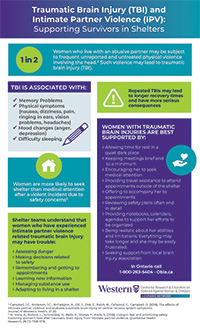Traumatic Brain Injury (TBI) and Intimate Partner Violence (IPV): Supporting Survivors in Shelters (2018)
 This infographic shows how women who face IPV are at increased risk for violence, which can lead to traumatic brain injury (TBI). It shares how TBI affects women and how survivors of IPV experiencing TBI may be supported.
This infographic shows how women who face IPV are at increased risk for violence, which can lead to traumatic brain injury (TBI). It shares how TBI affects women and how survivors of IPV experiencing TBI may be supported.
View PNG
View Infographic (PDF)
View Plain Text (PDF)
Traumatic Brain Injury (TBI) and Intimate Partner Violence (IPV): Supporting Survivors in Shelters
1 in 2 Women who live with an abusive partner may be subject to frequent unreported and untreated physical violence involving the head.1
Such violence may lead to traumatic brain injury (TBI).
TBI IS ASSOCIATED WITH:
- Memory Problems
- Physical symptoms (nausea, dizziness, pain, ringing in ears, vision problems, headaches)
- Mood changes (anger, depression)
- Difficulty sleeping
Women are more likely to seek shelter than medical attention after a violent incident due to safety concerns2 Shelter teams understand that women who have experienced intimate partner violence related traumatic brain injury may have trouble:
- Assessing danger
- Making decisions related to safety
- Remembering and getting to appointments
- Learning new information
- Managing substance use
- Adapting to living in a shelter Repeated TBIs may lead to longer recovery times and have more serious consequences
WOMEN WITH TRAUMATIC BRAIN INJURIES ARE BEST SUPPORTED BY:
- Allowing time for rest in a quiet dark place
- Keeping meetings brief and to a minimum
- Encouraging her to seek medical attention
- Providing travel assistance to attend appointments outside of the shelter
- Offering to accompany her to appointments
- Reviewing safety plans often and in detail
- Providing notebooks, calendars, agendas to support her efforts to be organized
- Being realistic about her abilities and limitations. Everything may take longer and she may be easily frustrated.
- Seeking support from local brain injury association
In Ontario call: 1-800-263-5404 · Obia.ca
[1] Campbell, J.C., Anderson, J.C., McFadgion, A., Gill, J., Zink, E., Patch, M., Callwood, G., Campbell, D. (2018). The effects of intimate partner violence and probable traumatic brain injury on central nervous system symptoms. Journal of Women’s Health, 27 (6)
[2] St. Ivany, A., Bullock, L., Schminkey, D., Wells, K., Sharps, P., Kools, S. (2018). Living in fear and prioritizing safety: Exploring women’s lives after traumatic brain injury from intimate partner violence. Qualitative Health Research, 28 (11) 1708-1718.
All our resources are open-access and can be shared (e.g., linked, downloaded and sent) or cited with credit. If you would like to adapt and/or edit, translate, or embed/upload our content on your website/training materials (e.g., Webinar video), please email us at gbvln@uwo.ca so that we can work together to do so.






